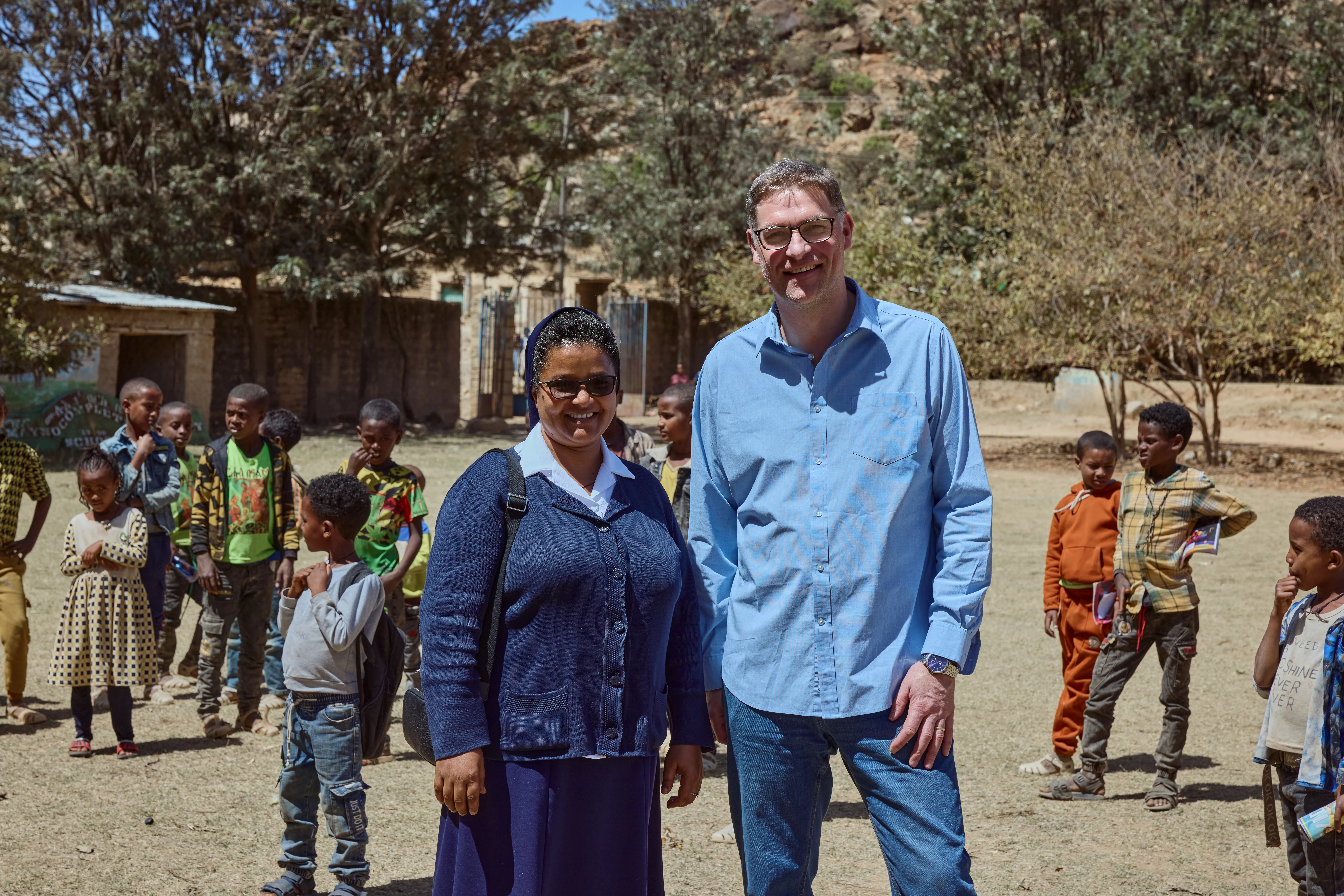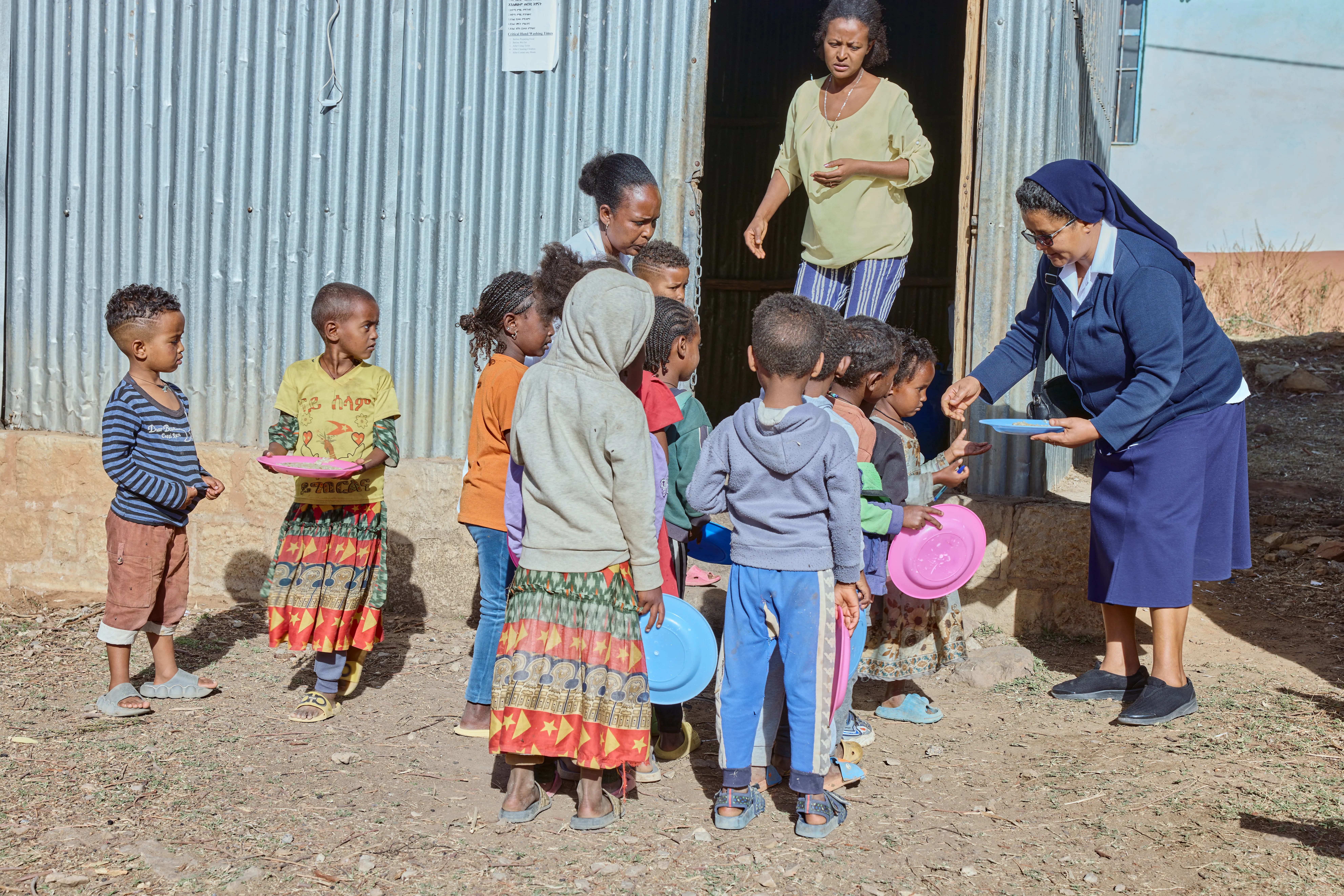
CNA Newsroom, Apr 13, 2024 / 06:00 am (CNA).
When the founder and CEO of the global school-feeding charity Mary’s Meals visited northern Ethiopia last month, he confirmed reports of a widespread hunger crisis unfolding rapidly in Tigray in the aftermath of civil war and ongoing drought.
“It’s as extreme as anything I’ve ever witnessed in terms of the current suffering and the potential for more deterioration unless there is a significant intervention,” Magnus MacFarlane-Barrow said.
The Scotland-based organization Mary’s Meals, which feeds almost 2.5 million children in some of the world’s poorest countries, has been partnering with the Daughters of Charity in Tigray since 2017 to provide meals for thousands of children.

Even when borders to the region were closed during a brutal two-year war between forces allied to the Ethiopian federal government and Eritrea and the Tigray People’s Liberation Front (TPLF), the Daughters of Charity, led by Sister Medhin Tesfay, remained in the region. The religious order is believed to have been the only one operating there during the conflict.
“Thankfully [the sisters] had access to supplies because of our ongoing school feeding/food aid work and were determined to do what they could to reach those most in need,” MacFarlane-Barrow told CNA. “There were many challenges because of the ongoing conflict, the regular communications blackouts, the disruption to banking services, and closure of supply routes, but our partner colleagues are not only amazingly dedicated but also very resourceful, and the outreach we achieved together during the conflict was truly remarkable.”
The Daughters of Charity has supported vulnerable people in Tigray since the early 1970s. The order’s first house there, where Sister Medhin lives and serves, was established in 1973. There are 65 Daughters of Charity in Ethiopia, and 15 are based in Tigray.
A growing and largely unreported crisis
The war, which began in November 2020 and raged for two years, displaced millions, destroyed essential infrastructure and health services, left untold numbers injured and traumatized, and claimed an estimated 600,000 lives. After the war officially ended, interruptions to aid supplies in 2023 compounded by failed rainy seasons have resulted in severe drought, accelerating the region’s humanitarian crisis. Journalists still struggle to gain access to the area, so the situation is largely underreported.

The Integrated Food Security Phase Classification (IPC) projections indicate that the majority of Tigray is currently experiencing emergency levels of hunger, and some households will likely be in “catastrophe/famine by July.”
In the biggest hospital in the region’s capital of Mekelle, Dr. Abraha Gebreegziabher, a local pediatrician, told Mary’s Meals that more and more children are dying from malnutrition in the hospital.
“We are seeing three times as many cases of malnutrition as normal, and the mortality rate is five times higher. The number of children dying from malnutrition was quite stable for the last 13 years, but since the war, it’s doubled,” he said. “Previous deaths were generally linked to other health conditions, but now malnutrition is a singular cause on its own.”
Tigray is home to over 7 million people, and more than 4.5 million people there are now in need of aid. According to MacFarlane-Barrow, over a million are displaced and living in camps, 75% of lactating mothers are malnourished, and more than half of the children are out of school, with many more continuing to drop out because of hunger.
Pandemic closures and war
In 2020, when schools closed initially due to the pandemic, Mary’s Meals helped the Daughters of Charity to provide take-home rations to families with children who had previously been receiving meals at school.

As schools prepared to reopen later that year, the civil war broke out, and millions of people across Tigray fled to seek safety. Across Mekelle, schools became temporary shelters for internally displaced people (IDPs). Despite communications blackouts, limited access to food and cash, and ongoing violence, Mary’s Meals continued to assist the Daughters of Charity so they could provide meals and other essential support to more than 30,000 people during the conflict.
After the cease-fire, as some people returned to their villages, the Daughters of Charity, supported by Mary’s Meals, continued to deliver food aid. As soon as schools were able to reopen in 2023, the sisters restarted their in-school feeding as quickly as possible, concentrating on areas of great need in Eastern Tigray. The school feeding program was fully reinstated at the end of 2023.
However, in some parts of the region, schools have remained closed, and people have been unable to return to their villages. Regional statistics suggest that more than half of all primary-age children in Tigray (53%) are not currently enrolled in school, with the situation made worse by serious staff shortages and damage to school buildings sustained during the war. Approximately 15,000 teachers are still unaccounted for, and 95% of classrooms in the Central Zone of Tigray, an area where much of Mary’s Meals school feeding takes place, are damaged because of the war.
An appeal to help brothers and sisters in need
“It’s hard to exaggerate how many different things are making life so difficult here,” MacFarlane-Barrow said in a video made during his visit to Tigray last month. “[This] famine could become one like the early ’80s when a million people died. Surely at this stage in the history of mankind, that can’t happen again in this world of plenty. We need to act. We need to grow our school feeding program; everyone is asking if they have a future … let’s keep going with all our strength, urgently.”

Mary’s Meals is currently holding an appeal to raise funds to be able to expand its program to reach thousands more children with meals.
In a recent video, Sister Medhin discussed the sisters’ challenges in Tigray, exhorting everyone to act.
“Our voices, our suffering, our pain, should be heard. And accordingly, we expect a concrete response by the people who have power in their hands, and by those who can share maybe from the little they have, and from the access they have,” she said.
“I really want them to do something very, very soon because we don’t want more people to die,” she continued. “We are talking about people dying of hunger in the 21st century. That should put many in shame. It is shameful when you know your brother and your sister in any part of the world [are hungry]. I just want [people] to do what is within their hands… All you need is a heart that is loving and a mind that can decide to do it.”
If you value the news and views Catholic World Report provides, please consider donating to support our efforts. Your contribution will help us continue to make CWR available to all readers worldwide for free, without a subscription. Thank you for your generosity!
Click here for more information on donating to CWR. Click here to sign up for our newsletter.




Leave a Reply